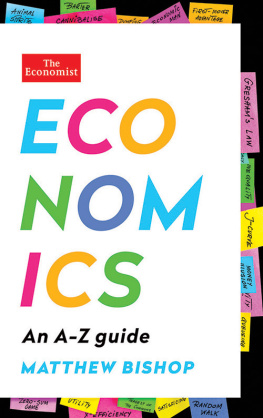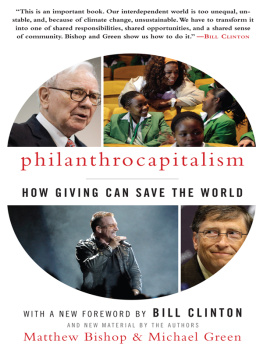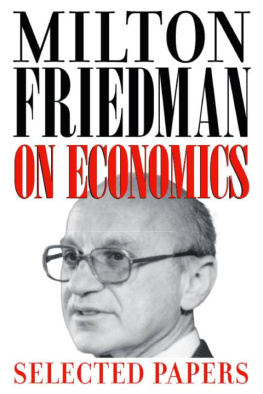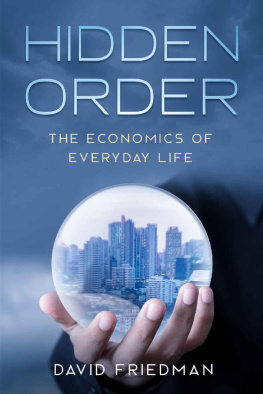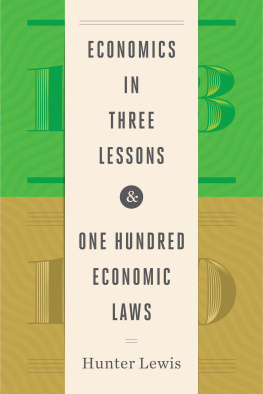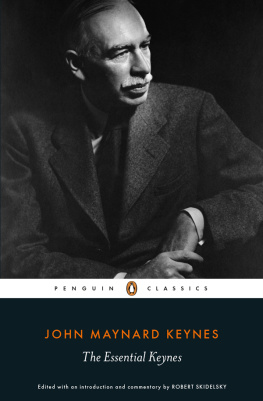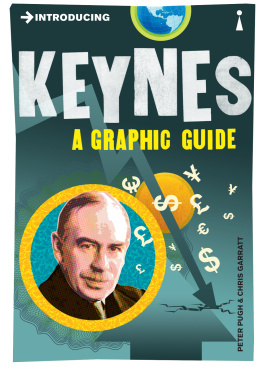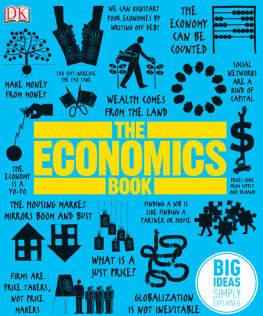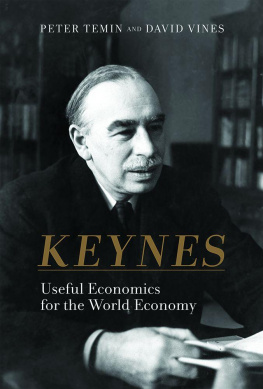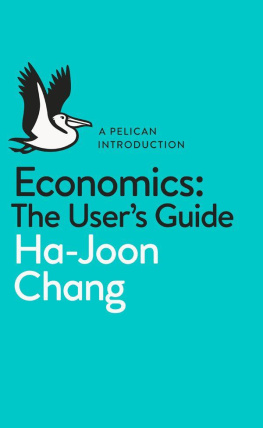ECONOMICS
An AZ guide
MATTHEW BISHOP, a senior editor at The Economist Group, is an award-winning journalist and longtime writer. His roles at The Economist, which he joined as economics correspondent, have included business editor, Wall Street editor, globalisation editor and New York bureau chief. He is the author of several books, including Philanthrocapitalism: How Giving Can Save the World (described as important by President Bill Clinton) and The Road from Ruin, which set out an agenda for the reform of capitalism after the 2008 crash. He is a member of the World Economic Forums Global Agenda Council on Global Governance. He was the official report author of the Taskforce on Social Impact Investment established by the governments of the G8, and a member of the Advisors Group of the UN International Year of Microcredit. He co-founded and advises the #givingtuesday campaign and the Social Progress Index. He is on Twitter as @mattbish.

THE ECONOMIST IN ASSOCIATION WITH PROFILE BOOKS LTD. AND PUBLICAFFAIRS
Copyright Matthew Bishop 2003, 2009, 2016
First published in 2003 by Profile Books Ltd. in Great Britain.
Published in 2016 in the United States by PublicAffairs, an imprint of Perseus Books, adivision of PBG Publishing, LLC, a subsidiary of Hachette Book Group, Inc.
All rights reserved.
Printed in the United States of America.
No part of this book may be reproduced, stored in or introduced into a retrieval system, or transmitted, in any form or by any means (electronic, mechanical, photocopying, recording or otherwise), without the prior written permission of both the copyright owner and the publisher of this book, except in the case of brief quotations embodied in critical articles and reviews. For information, address PublicAffairs, 250 West 57th Street, 15th Floor, New York, NY 10107.
The greatest care has been taken in compiling this book. However, no responsibility can be accepted by the publishers or compilers for the accuracy of the information presented.
Where opinion is expressed it is that of the author and does not necessarily coincide with the editorial views of The Economist Newspaper.
While every effort has been made to contact copyright-holders of material produced or cited in this book, in the case of those it has not been possible to contact successfully, the author and publishers will be glad to make amendments in further editions.
PublicAffairs books are available at special discounts for bulk purchases in the U.S. by corporations, institutions, and other organizations. For more information, please contact the Special Markets Department at the Perseus Books Group, 2300 Chestnut Street, Suite 200, Philadelphia, PA 19103, call (800) 8104145, ext. 5000, or e-mail
Library of Congress Control Number: 2016937558
ISBN 978-1-61039-656-1 (PB orig)
ISBN 978-1-61039-657-8 (EB)
First Edition
10 9 8 7 6 5 4 3 2 1
Introduction
Why economics matters more than ever
There has never been a more exciting time for economics. Although economists themselves may be more unpopular than usual, especially those whose ideas helped bring about the financial crash of 2008 and the Great Recession that followed it, more than ever they are being turned to for insights and answers to the big questions affecting every aspect of life, including the sustainability of our planet. In this time of widespread questioning about where society is heading, and of vast and rapid change, if you want to know what is really going on, and what needs to be done, it is essential to have a working understanding of economics. Hence this book, written in the spirit of The Economist with the goal of bringing the intelligent non-economist up to speed.
Lets start with the most basic question: What is economics? Economics is what economists do, said Jacob Viner, a leading 20th-century economist, not very helpfully. Former US president Ronald Reagan described economists as unworldly people, who see something work in practice and wonder if it would work in theory. More usefully, the authors of Freakonomics note that economics, at its root, is the study of incentives: how people get what they want, or need, especially when other people want or need the same thing. Their recognition that people are often competing for the same things points to what is probably the best definition of economics: the study of how society uses its scarce resources or, more snappily, the science of choices.
Without scarcity of land, labour, raw materials, capital, entrepreneurial spirit, time there would be no need to make choices about how to use those things to greatest effect, and thus no need for economics. At its best, economics helps people, individually and collectively, to make the right choices and it shows them the most efficient way to use scarce resources in the process of achieving their goals.
Three aspects of economics are especially exciting today, because each of them urgently demands fresh thinking from the brightest minds in the profession.
The first is macroeconomics how best to manage an entire economy. The severity of the crash and the depth of the Great Recession came as a big surprise to most mainstream economists, though a few had given warning of impending dangers. In most countries the pace of economic recovery has been unexpectedly slow, too, surprising a conventional economic wisdom that had predicted a typical, relatively quick economic rebound.
The second, following from a revolution in microeconomics based on combining traditional economics with a more realistic model of human behaviour, focuses on generating new ways to improve how people live their daily lives. This includes developing innovative business models (such as the mobile-phone apps developed by Uber and Airbnb) and improving how government works by using so-called nudges to encourage people to behave in their (and societys) best interests in circumstances where they would otherwise make suboptimal choices.
Third, the severity of the Great Recession and the growing threat of climate change, among other things, have inspired an increasingly urgent debate about the relationship between economics and social, organisational and personal purpose. If trying to maximise GDP growth simply results in people taking on more debt than they can afford, leaving them vulnerable in an economic downturn, and doing things that threaten the sustainability of our environment, shouldnt we be using better goals to guide our economy, such as the Social Progress Index or Bhutan-style gross national happiness?
Rethinking macroeconomics
Macroeconomic debate is livelier today than at any time since the combination of free market laissez-faire economics and Milton Friedmans monetarism replaced the big-government, free-spending, Keynesian orthodoxy in the late 1970s/early 1980s. The crash of 2008 and subsequent Great Recession destroyed the credibility of claims that the economy had entered a new phase of Great Moderation, with permanently low rates of inflation and unemployment. The battle is on to develop a new paradigm for macroeconomic policy. The need is urgent, especially as populist solutions touted by politicians with little grounding in the economic realities of scarcity are catching on among frustrated electorates wanting answers to todays economic problems that do not require them to make hard choices.
The crash of 2008 and the subsequent Great Recession highlighted serious flaws in the previous macroeconomic conventional wisdom. Central banks and Treasury departments, the powerhouses of macroeconomic policymaking, stuffed to the gills with economists, largely failed to spot the crash coming and underestimated the damage it would do beyond the financial sector to the rest of the economy. (Economists in the private sector hardly did better, with the exception of the occasional economic Doctor Doom who predicted macroeconomic apocalypse.) They bought into the notion of the Great Moderation. They were also reassured that the financial system was capable of managing an ever greater amount of debt thanks to its adoption of risk-management systems based on cutting-edge financial economic theories.
Next page
